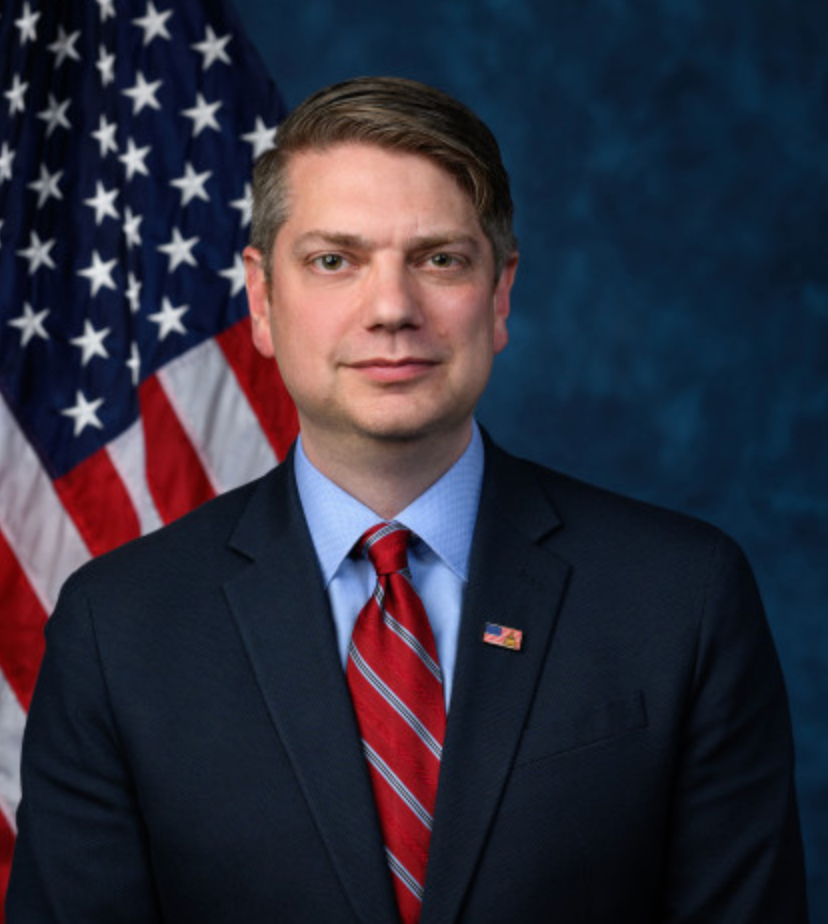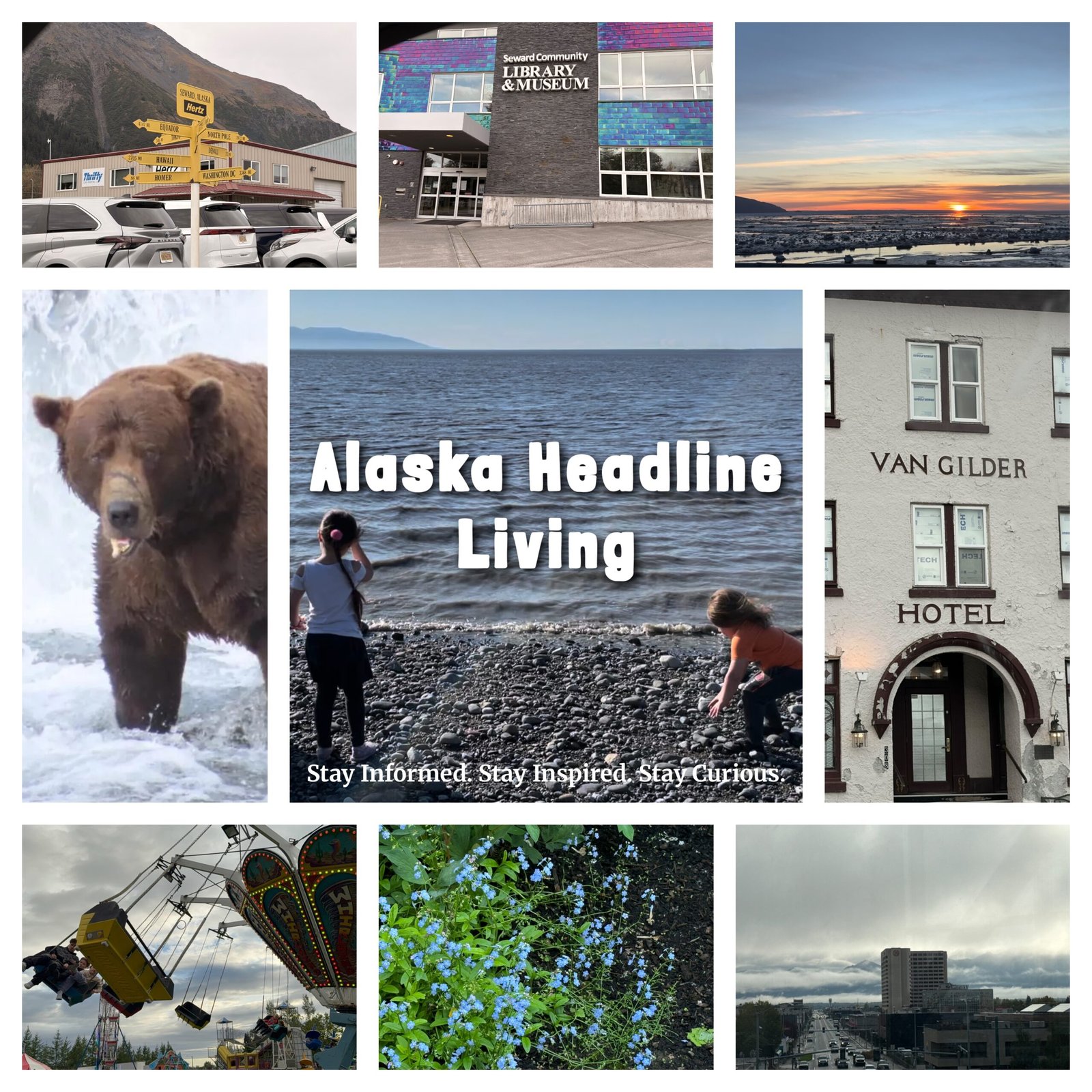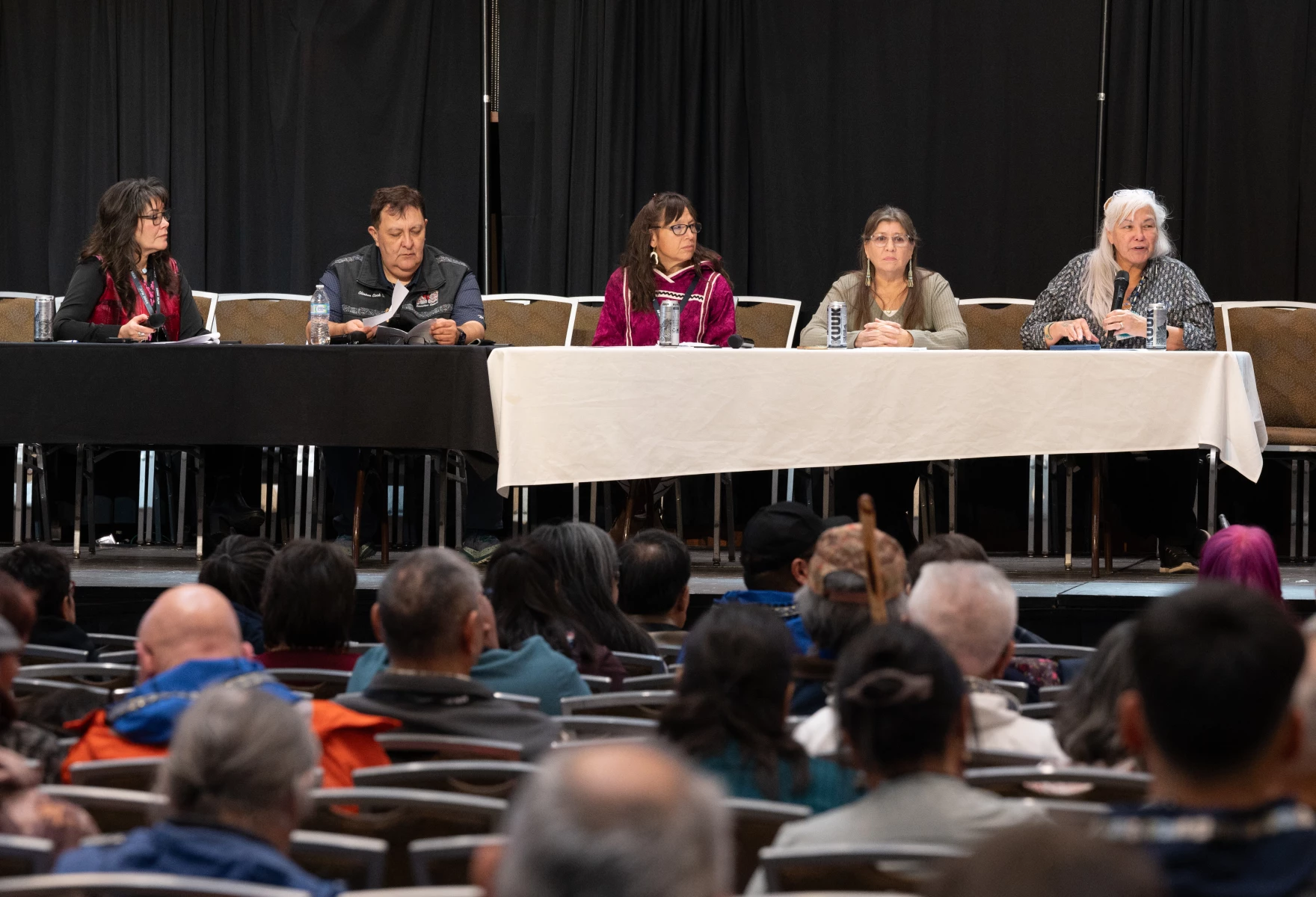(From left) Gayla Hoseth, incoming AFN co-chair, Clinton Cook Sr., president for the Craig Tribal Association, Natasha Hayden, co-chair of the Kodiak Island tribal coalition, Patty Schwalenberg, executive director of the Alaska Migratory Birds Co-Management Council, and Karen Linell, executive director of the Ahtna Intertribal Resource Commission./PC: Matt Faubion – Alaska Public Media
By Gina Hill | Alaska Headline Living | October 2025
At the Alaska Federation of Natives convention, delegates unanimously rejected proposed federal rollbacks to the Marine Mammal Protection Act, warning the changes would weaken core safeguards for whales, seals, and walrus central to Indigenous culture and survival.
By Gina Hill | Alaska Headline Living | October 2025
ANCHORAGE – Alaska’s largest Native gathering sent a clear and unanimous message to Washington this weekend: Hands off the Marine Mammal Protection Act, at least as it stands today.
At its annual convention, the Alaska Federation of Natives (AFN) passed Resolution 25-42, opposing a draft bill from U.S. Rep. Nick Begich that would significantly rewrite portions of the 1972 Marine Mammal Protection Act (MMPA). The measure passed on a unanimous roll-call vote, ma rare display of complete agreement among hundreds of delegates representing villages, tribes, and regional corporations from across the state.
A “weakened standard” for ocean life

The Begich proposal, first circulated as a “discussion draft” this summer, aims to modernize the half-century-old law. But critics say it instead lowers the bar for protecting species that Alaska Native communities depend on for food and culture.
One of the bill’s most consequential tweaks would redefine “optimum sustainable population,” a core concept in the law. The current definition requires that species be maintained at the “maximum productivity” level, a standard that keeps whale and seal numbers robust. The draft bill would change that benchmark to the minimum levels “necessary to support continued survival.”
“It sounds small. But that one word change, from ‘maximum’ to ‘necessary’, could make all the difference,” said marine policy analyst Esther Aaluk of Utqiaġvik. “It tells agencies they can manage for survival, not abundance. That’s a huge shift.”
Faster permits, fewer safeguards
The draft would also shorten federal review timelines for industrial projects that might “incidentally take” marine mammals, meaning unintentional injury or disturbance. Under the new wording, if agencies don’t act within a set number of days, permits could be automatically approved.
That could have real-world consequences for Alaska’s coastal communities. Seismic surveys, shipping routes, and offshore development often overlap with traditional hunting and migration areas for whales, seals, and walrus.
“Automatic approvals mean we might not even know a project’s been green-lit until it’s happening in our hunting waters,” said Shishmaref delegate Annie Kokeok. “That’s unacceptable.”
“Harassment” redefined and restricted
Another proposed change would narrow what counts as harassment of marine mammals. Currently, the law includes activities with “the potential to injure.” Begich’s draft would limit it to actions that actually cause injury, a shift environmental groups say could excuse chronic noise or vessel disturbance that drives animals away from feeding grounds.
“Noise doesn’t always kill, but it makes the whales disappear,” said Bowhead hunter Jack Nageak of Nuiqsut. “If they’re gone, we don’t eat.”
Mapping the impacts across Alaska
- North Slope & Bering Strait (Iñupiat communities): Depend on bowhead whales and ice seals. Lowered population goals and looser noise rules could allow more shipping and seismic exploration near critical hunting routes.
- Yukon-Kuskokwim Delta (Yup’ik and Cup’ik communities): Rely heavily on ringed and bearded seals for subsistence. Faster industrial permitting could push activities into crucial migration and pupping seasons.
- Bristol Bay and Aleutian regions: Marine mammal shifts could compound stress on already-volatile marine ecosystems, affecting both traditional hunts and the commercial fisheries many villages depend on.
- Southeast Alaska: Tribes that harvest harbor seals and other coastal species warn that looser “harassment” definitions could permit increased cruise traffic and industrial noise in fjords where seals pup.
AFN’s message to Congress: consult tribes first
AFN’s resolution calls for full tribal consultation before any amendments advance in Congress, emphasizing that changes to the MMPA must strengthen, not dilute, Indigenous subsistence protections.
“The magnitude of the intent to amend the MMPA is going to threaten and jeopardize our continued protection of subsistence harvest,” the resolution reads.
Begich, who addressed the AFN convention earlier in the week, defended the proposal as a “modernization effort,” arguing that the current law is outdated and overly restrictive. His office said he would “take the feedback under consideration.”
What happens next
The AFN vote doesn’t stop the bill. It’s a formal stance, not a veto, but it adds political weight to tribal opposition ahead of any congressional markup. If the draft advances without significant consultation or amendments, Native organizations are likely to mobilize in Washington and, potentially, in court.
For many Alaska Natives, the issue cuts far deeper than policy.
“Our relationship with marine mammals is not about sport or profit,” said Kokeok. “It’s about survival. You can’t rewrite that from D.C.”
At a glance: Proposed changes to the Marine Mammal Protection Act
| Provision | Current Law | Begich Draft Proposal | Potential Impact on Alaska Natives |
|---|---|---|---|
| Optimum Sustainable Population | Must maintain “maximum productivity” | Lowers to “necessary for survival” | Allows smaller populations; weaker recovery goals |
| Definition of Harassment | Includes potential injury or disturbance | Requires actual injury | Makes it harder to regulate chronic noise or displacement |
| Incidental Take Permits | Agencies have full review time, no automatic approvals | Shorter deadlines, possible automatic approval | Less consultation time for tribes |
| Tribal Consultation | Required via general federal law | No new mandates | Reduces guaranteed tribal input |
| Overall Protection Level | Conservative, precautionary | More permissive toward industry | Greater risk to subsistence resources |
Bottom line:
Alaska’s Indigenous leaders say the MMPA isn’t just about animals … it’s about people.
And they’re not about to let Congress forget it.





